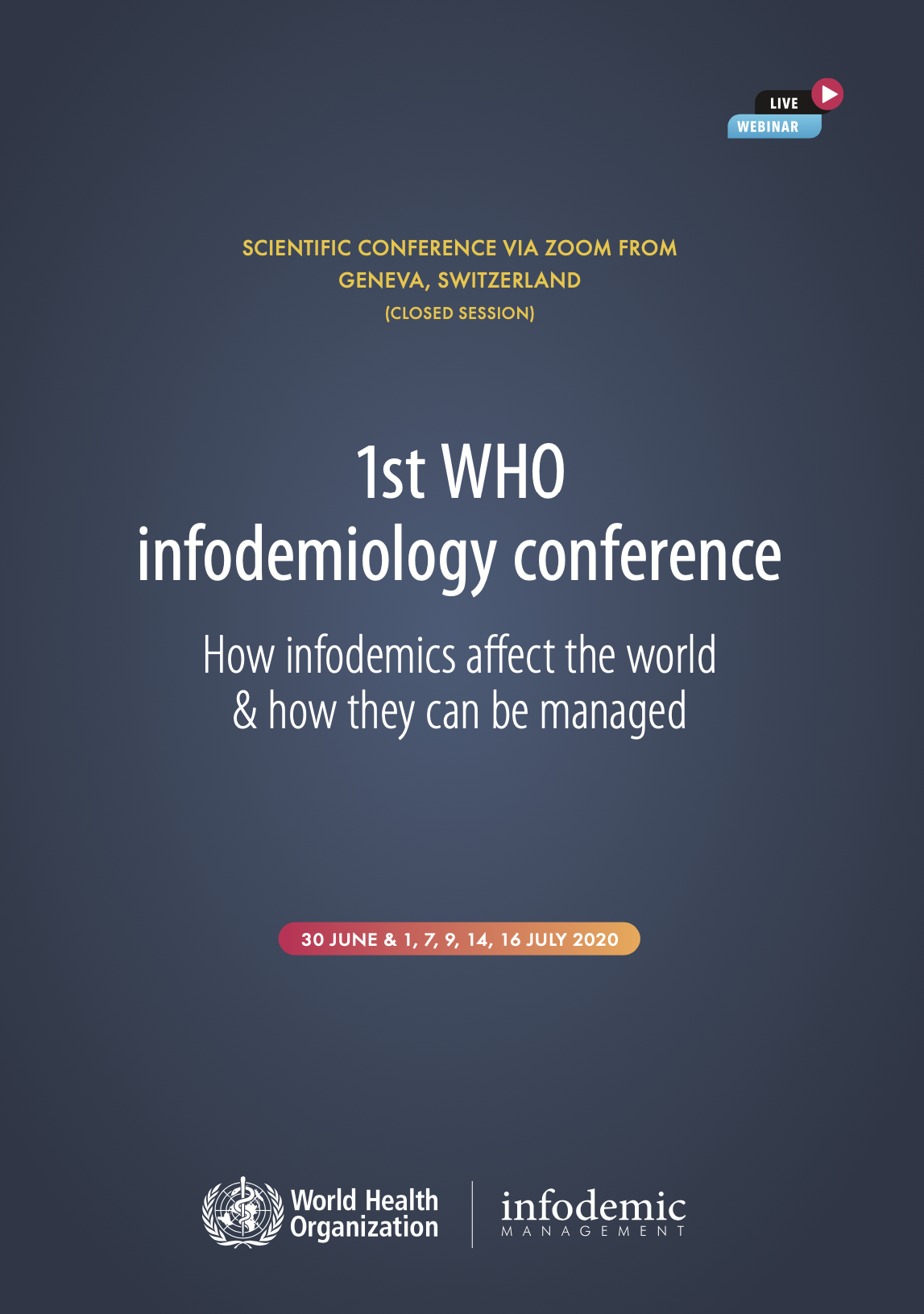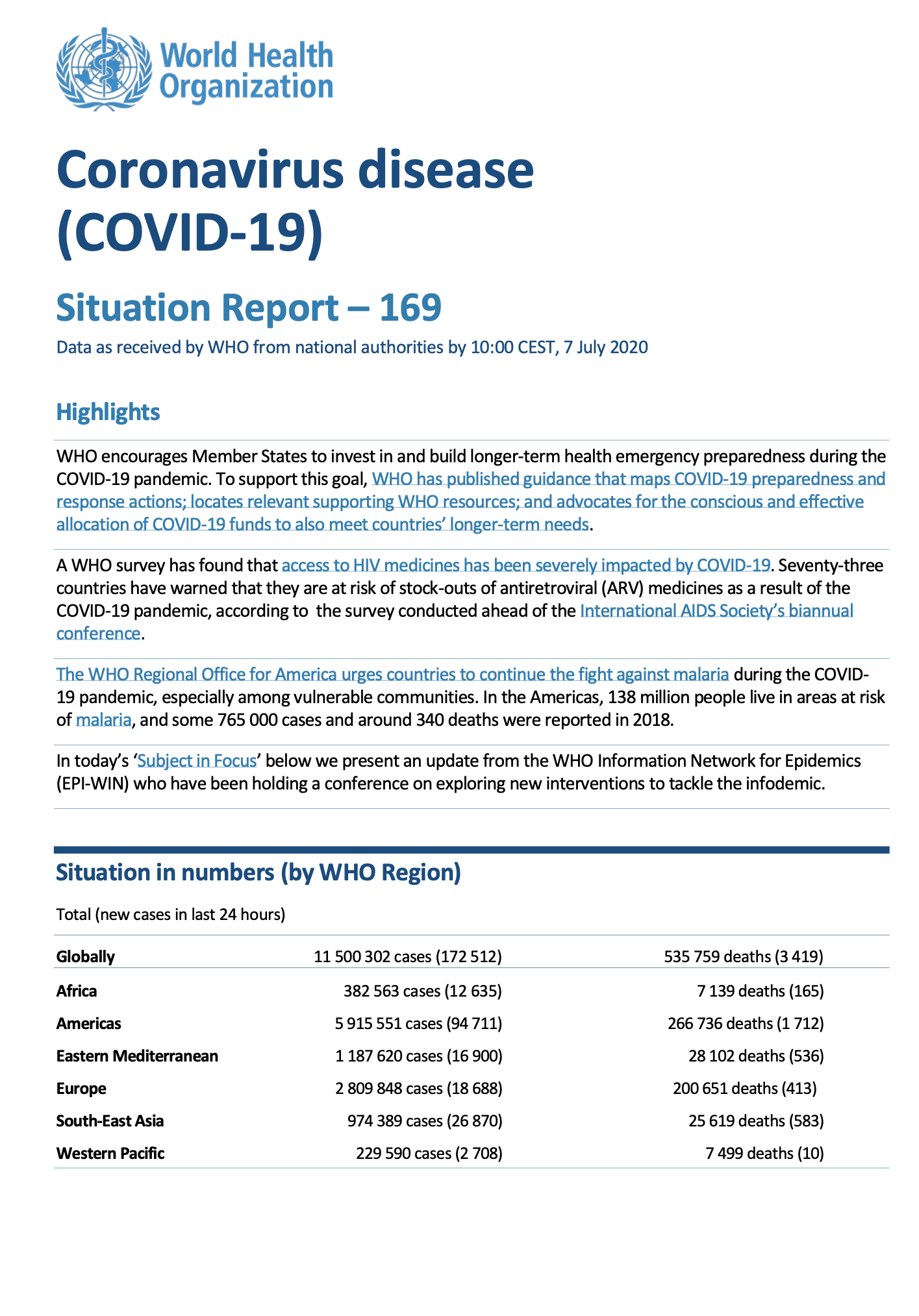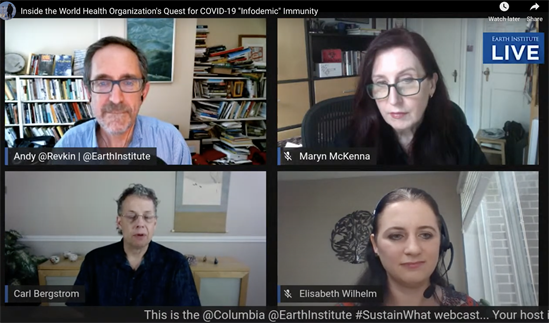Post-conference: 1st WHO Infodemiology Conference
From 29 June to 21 July 2020 WHO held the 1st WHO Global Infodemiology Conference.
An infodemic cannot be eliminated but it can be managed. To respond effectively to infodemics, WHO has called for adaptation, development, validation and evaluation of new evidence-based measures and practices to prevent, detect and respond to mis- and disinformation. In the context of this meeting “infodemiology” is defined as the science behind managing infodemics.
The working session of the conference was in the form of closed discussion sprints on predesigned topics.
The purpose of this webinar was to present the experience and outcomes of the conference.
Panelists:
- Stefano Burzo, World Health Organization
- Margaux Mathis, World Health Organization
- Brian Yau, World Health Organization
- Elisabeth Wilhelm, US Centers for Disease Prevention and Control
- Emily Vraga, University of Minnesota, US
- Pier Luigi Sacco, IULM University, Italy
- Lisa Talia Moretti, University of London, UK
- Meaghan E. Charlton, Sabin Vaccine Institute
The webinar was hosted by Sarah Hess, EPI-WIN, WHO’s Information Network for Epidemics.
Developing trans-disciplinary science: infodemiology, the science behind infodemic management, COVID-19 Situation Report – 169 |
Inside the World Health Organization's quest for COVID-19 "infodemic" immunity
Streamed live on 24 July 2020
Andy Revkin (@Revkin) of the Earth Institute, Columbia University, explores the results of the World Health Organization's pioneering international online conference aiming to energize the nascent field of "infodemiology" - science assessing how the world can do better at cutting through online noise and disinformation to foster better public and policy responses to the pandemic with Elisabeth Wilhelm (@ewilhelm) from the US Centers for Disease Prevention and Control, the award-winning disease-focused journalist and author Maryn McKenna and Carl T. Bergstrom (@CTBergstrom), an epidemiologist at the University of Washington.
1. Submission to collaborative joint issues on Infodemiology WHO and:
- Big Data & Society, Anatoliy Gruzd, Co-editor: 4.577 impact factor
- The International Journal of Intelligence, Security and Public Affairs, Ruben Arcos, Deputy Editor
- Health Security, Tara Sell Kirk, Associate Editor: 1.297 impact factor
- Pan American Journal of Public Health (PAJPH), Damián Vázquez, Editor-in-Chief: 0.539
- Eastern Mediterranean Health Journal (EMHJ), Ahmed Al-Mandhari, Editor-in-Chief: 0 .969
2. Submit a proposal to SABIN Institute small grants call
Deadline: 31 July 2020, 23:59 EST
You can find the link to the REP here.
To apply, please complete an application here.
Sample templates for project timeline and budget are here.
Any questions regarding proposal submission can be addressed to: smallgrants@sabin.org.
3. Volunteer to be a reviewer for papers, grant proposals, policy briefs
4. Conceptualize and support a world’s first infodemiology PhD
5. Volunteer to be beta tester for upcoming community of research forum, please contact Elisabeth Wilhelm or Tina Purnat.
6. Consider submitting papers to journals:
- Special issue on Digital Communication and Hybrid Threats for the Journal Icono 14, please see the Call for Paper with the topics here.
- Conference for Trust and Trust Online, please see Call for Paper here.
- Special Issue on Misinformation on the Web of Elsevier Journals, please see Call for Paper here.
7. Join events and conferences:
- To join the EU Disinfo Lab virtual conference, 28 September to 2 October 2020, please click here.
- To join CONNECT University sessions on "Tackling online disinformation", please click here.
- Training and resources for journalists in an age of disinformation at First Draft Org, please click here.
- To join WHO EPI-WIN webinars, please click here.
8. Apply for fellowship:
- Journalism in the Era of Disinformation Fellowship, apply here.
- John S. Knight Community Impact Fellows, apply here.




